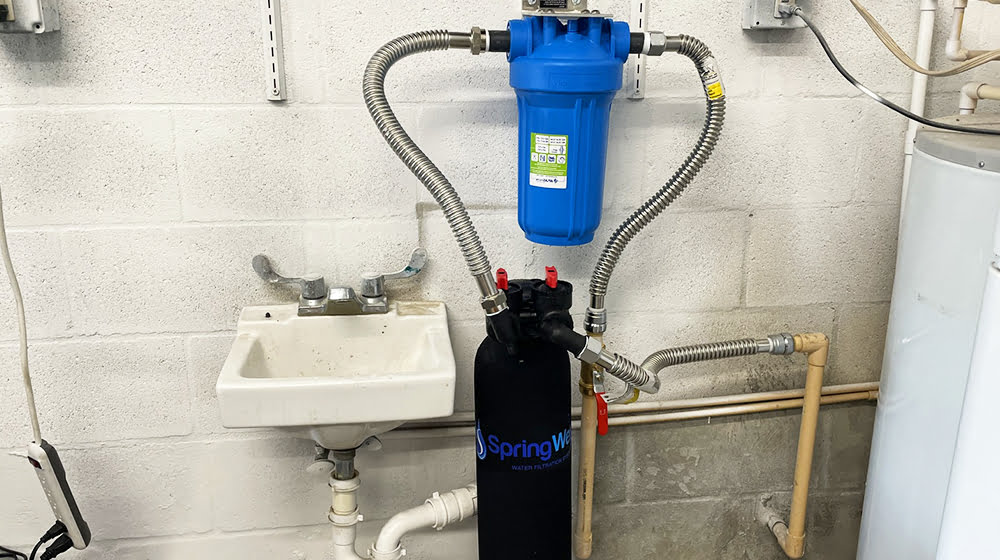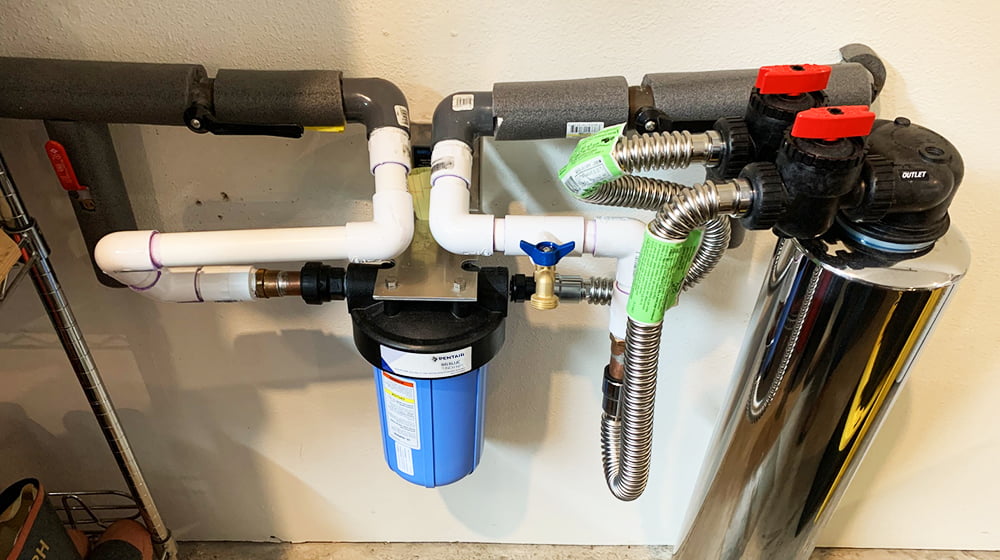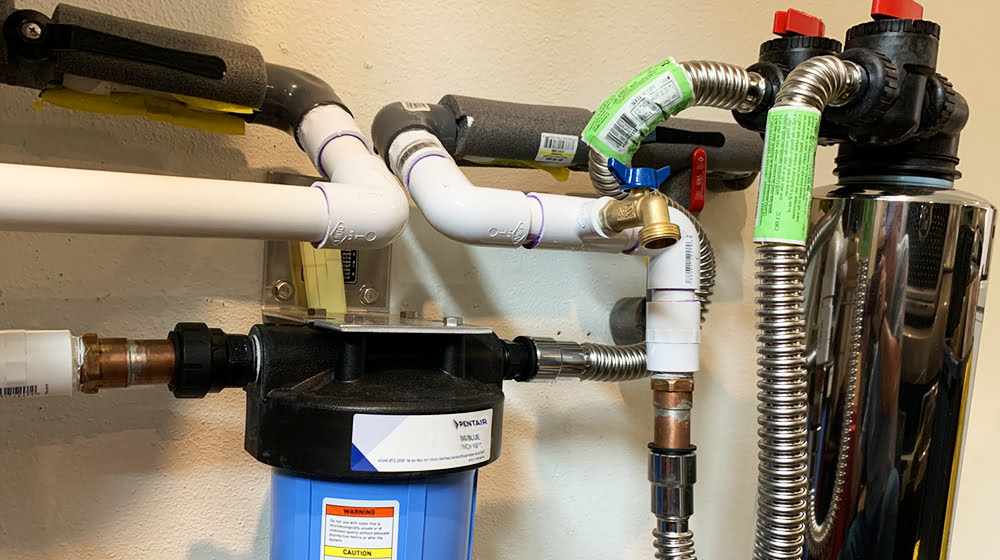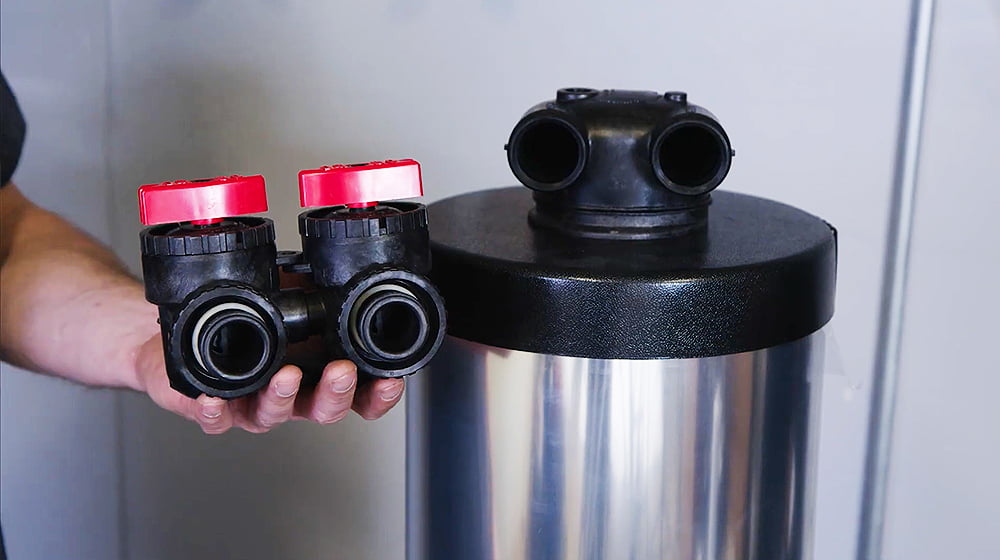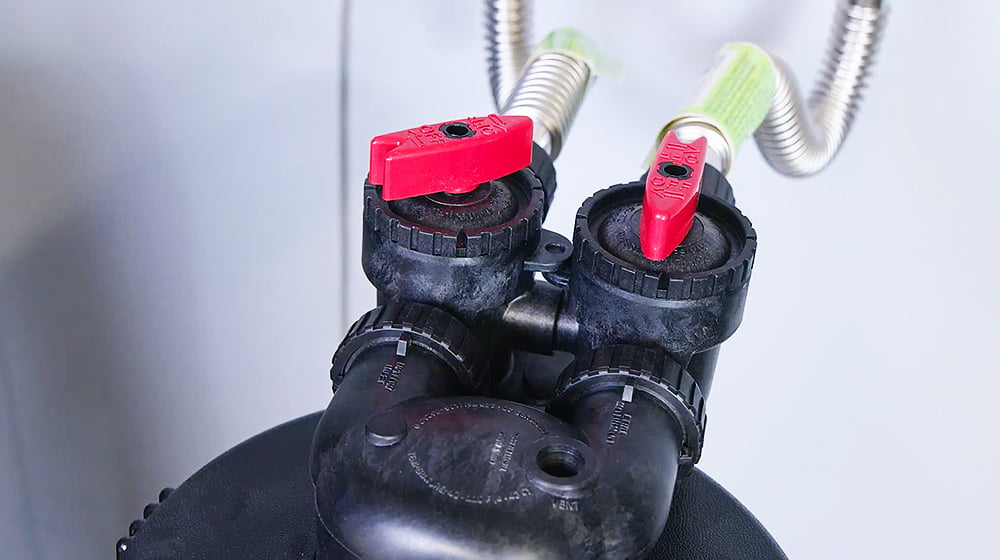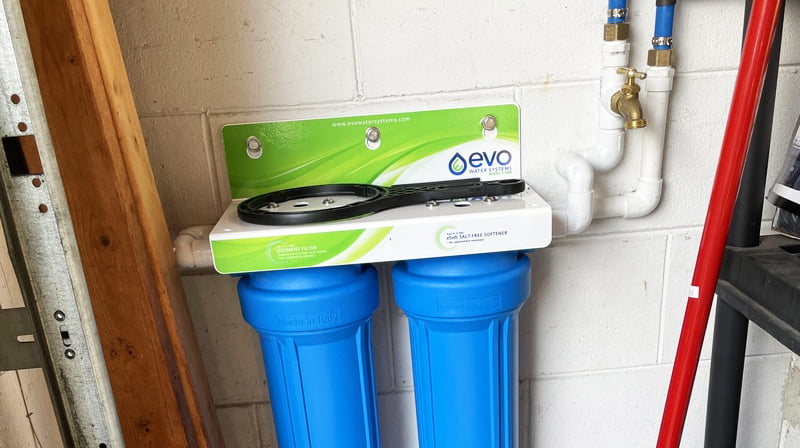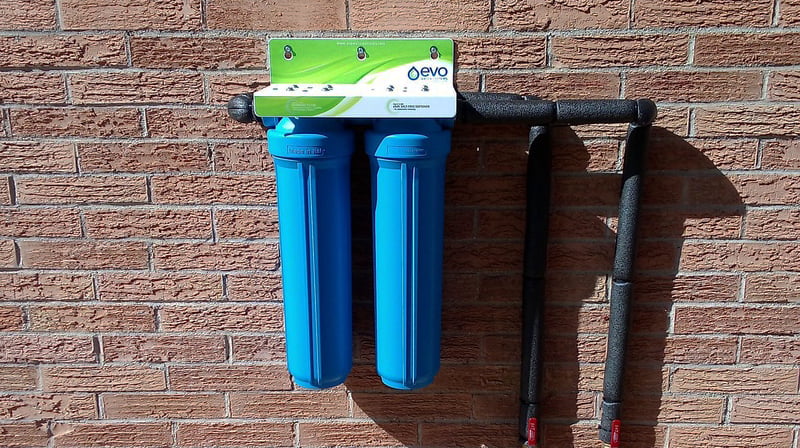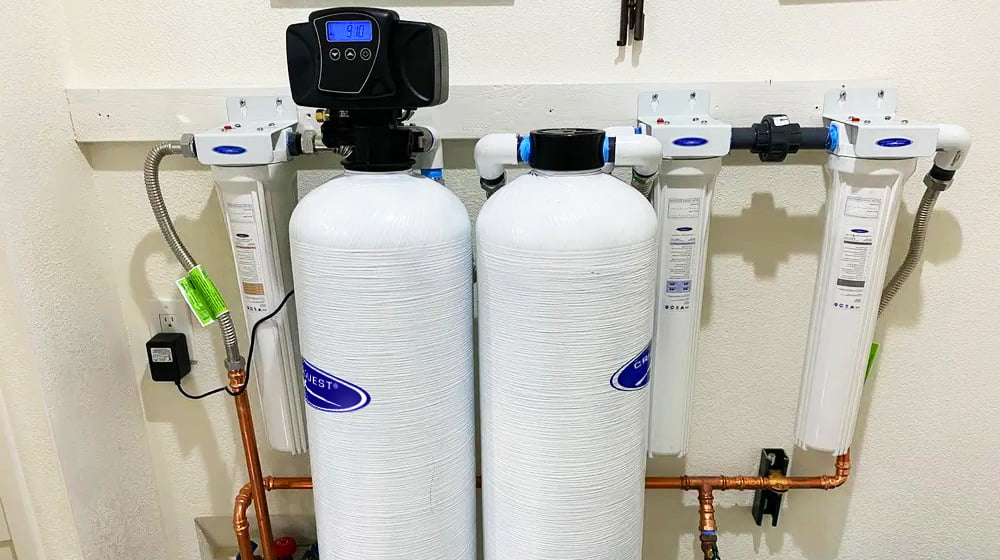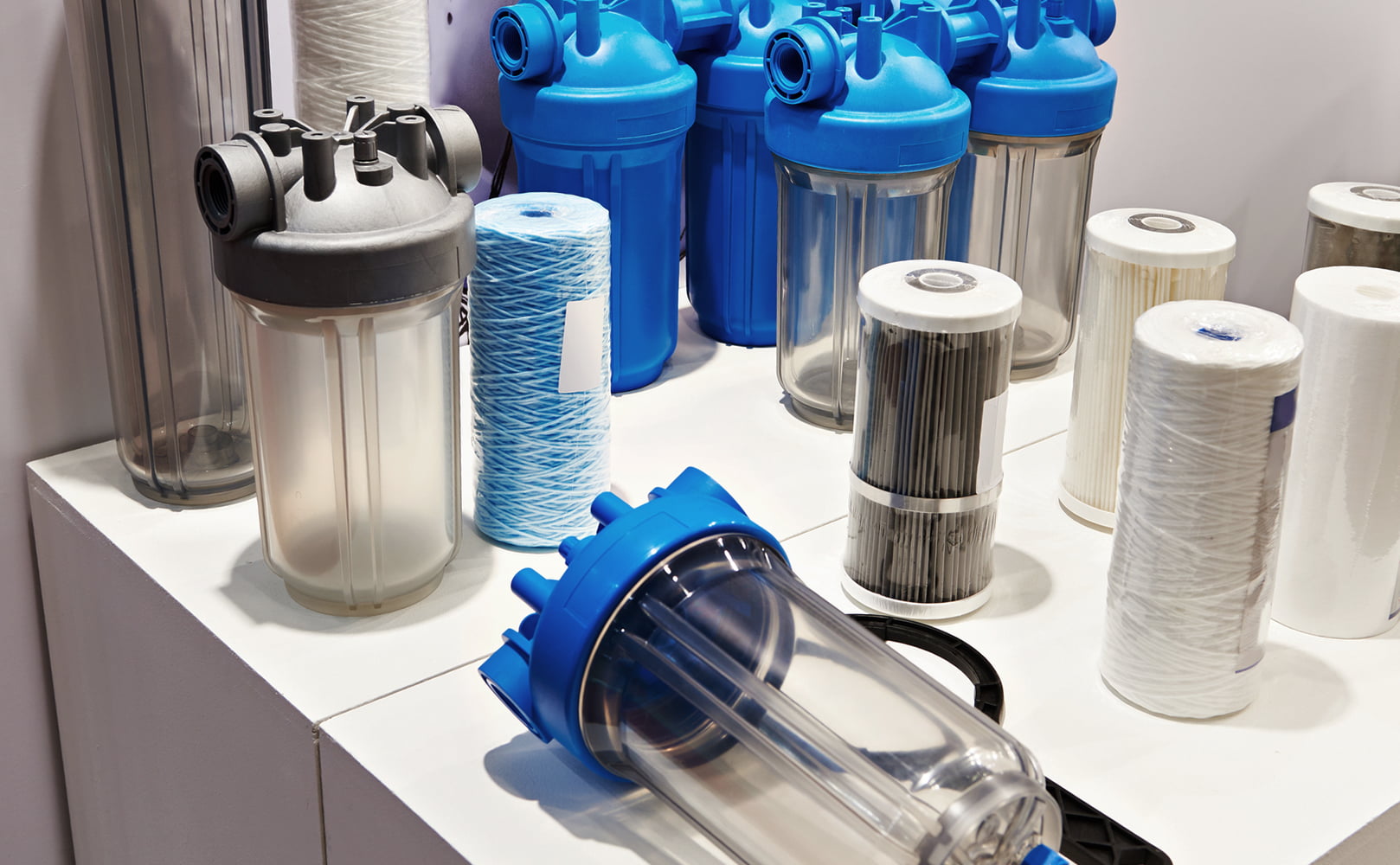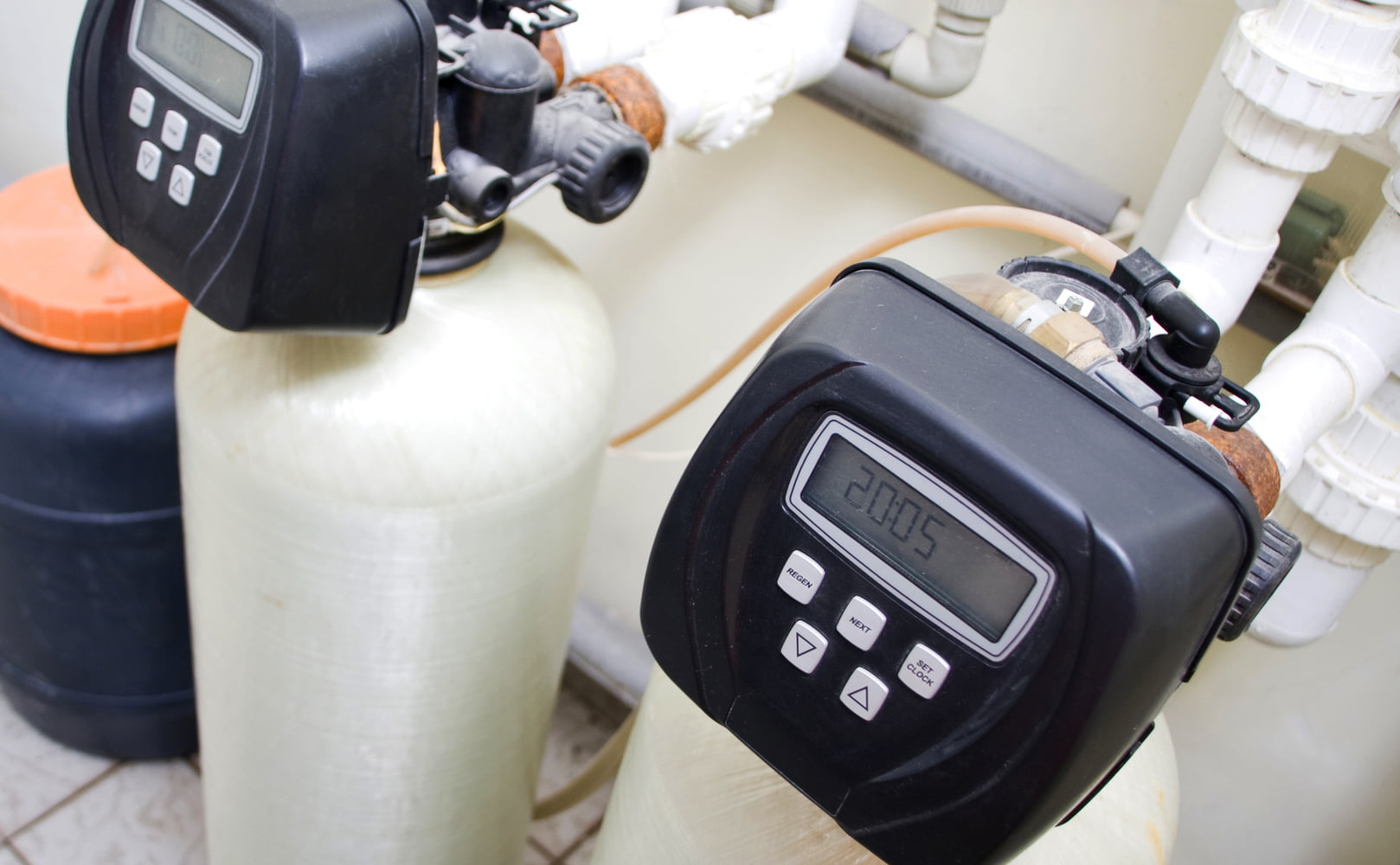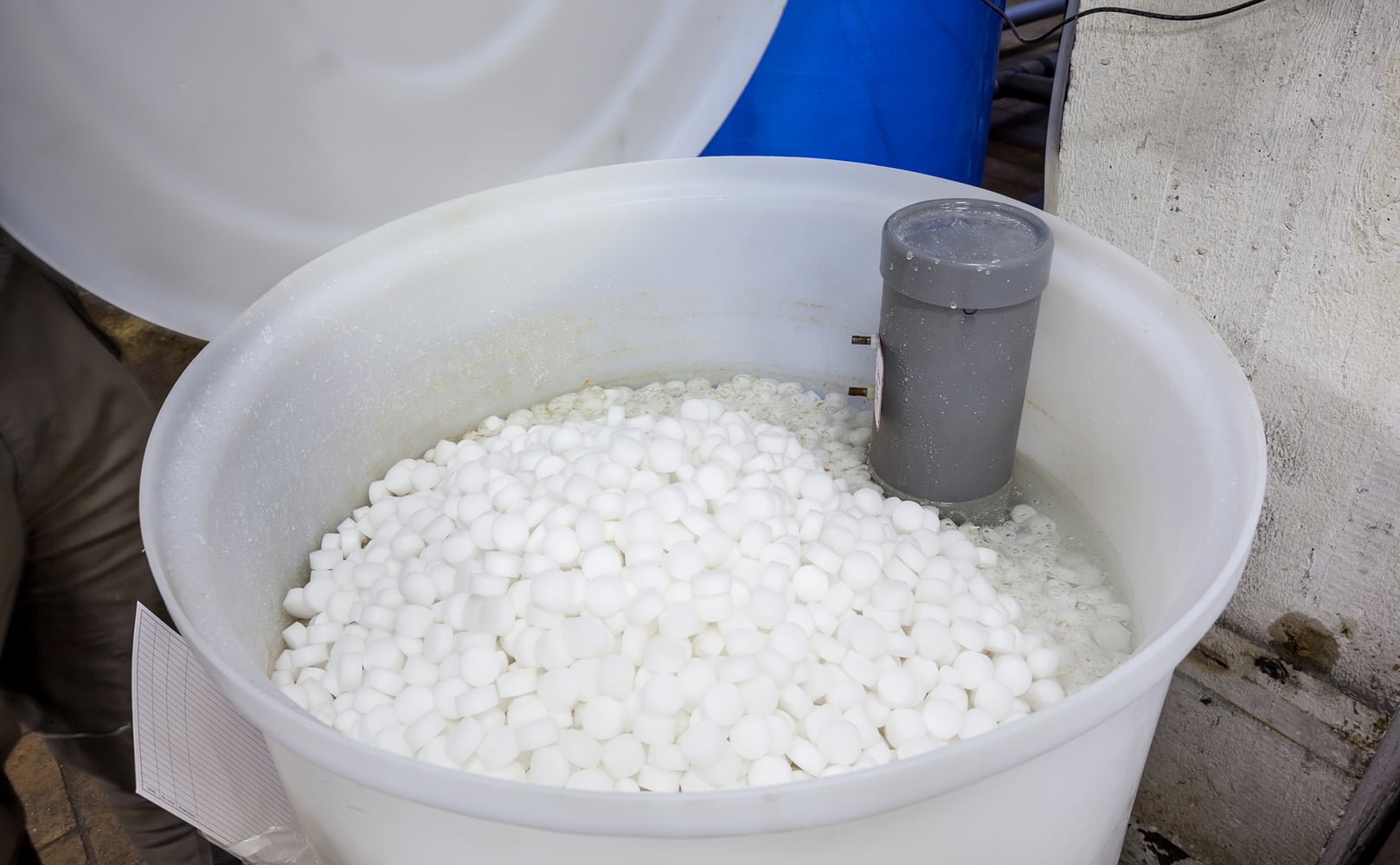8 Best Water Conditioners (*Update 2024)
Written by: Gene Fitzgerald // Last Updated: Jan 31, 2024
This page may contain affiliate links. If you buy a product or service through such a link we earn a commission at no extra cost to you. Learn more.
Top Pick: What’s the Best Water Conditioner?
The best water conditioner in 2024 is the SpringWell FS, since it uses proven technology to eliminate the scaling effects of hard water to protect your family and home. Plus, it’s suited for all home sizes, is easy to set up and maintain, and it comes with a 6-month satisfaction guarantee and lifetime warranty.
Struggling to find the perfect water conditioner? You came to the right place! Our team has conducted an extensive market analysis to bring you the most comprehensive water conditioner buying guide.
Starting with 15 models, we invested significant time and effort in researching and reviewing to narrow it down to the top 8 systems we believe are worth your consideration.
No Time to Read? Check Our List of the Best Water Conditioners!
| System | Details | |
|---|---|---|
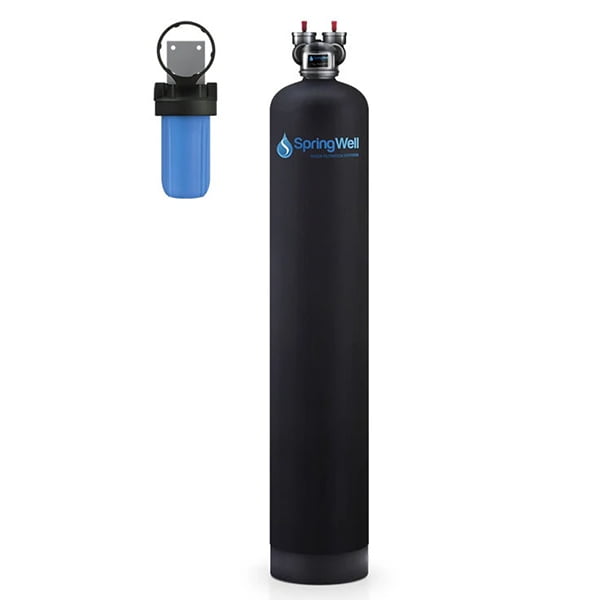 Best Overall: SpringWell FutureSoft |
Overall Rating: 5.0/5.0
Get 5% Off! Use Code: |
Price: $$$ Method: TAC System Flow Rate: 12-20 gpm Water For: 1-6+ People Warranty: Lifetime Read Review: Click Mike’s Video Review: Click |
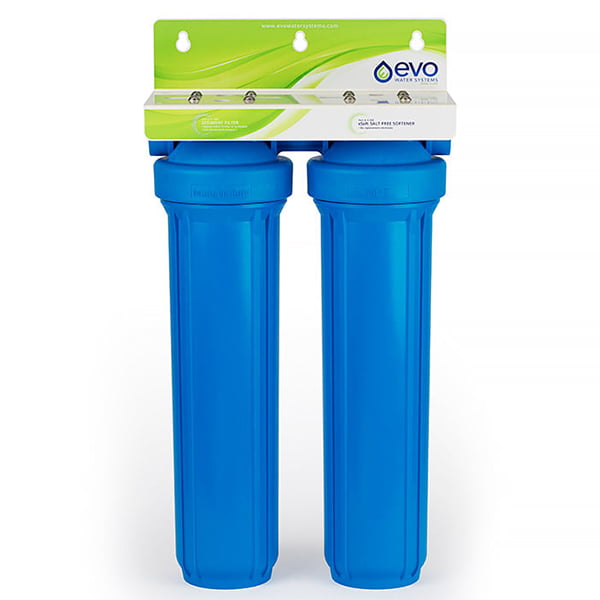 Best Budget Pick: Kind Water Systems E-2000 |
Overall Rating: 5.0/5.0
Get 5% Off! Use Code: |
Price: $$ Method: TAC System Flow Rate: Up to 15 gpm Water For: 1 to 6 People Warranty: Lifetime Read Review: Click |
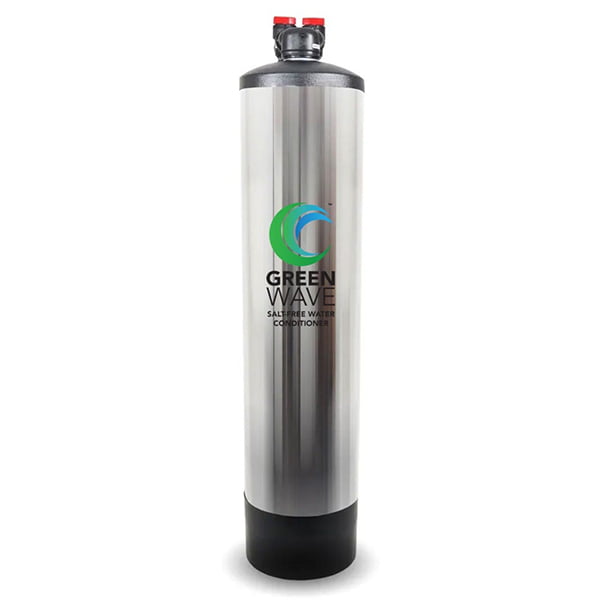 The Runner-Up and Best for Very Large Homes: USWS |
Overall Rating: 4.5/5.0
Get 5% Off! Use Code: |
Price: $$$ Method: NAC System Flow Rate: 10-25 gpm Water For: 1-7+ People Warranty: Lifetime, 4 Years Read Review: Click |
 Best for Electronic Water Conditioning: Eddy |
Overall Rating: 4.5/5.0
|
Price: $ Method: Electromagnetic System Flow Rate: – Water For: For Small to Large Homes Warranty: Lifetime Read Review: Click |
Water Conditioner Reviews
Our Top Picks
- SpringWell FutureSoft – Best Overall
- USWS GreenWave – Runner-Up and Best for Very Large Households
- Kind Water Systems E-2000 – Best Budget Pick
- Eddy Electronic Water Conditioner – Best for Electronic Descaling
- P3 P7920 Magnetic Water Conditioner – Best for Magnetic Descaling
- Crystal Quest Whole House Water Conditioner – Best for Pre & Post-Filtration
- Aquasana SimplySoft
- Pelican NaturSoft
1. Best Overall Water Conditioner: SpringWell FutureSoft
In our opinion, the best water conditioner in 2024 is the SpringWell FutureSoft. It uses Template Assisted Crystallization (TAC) to reduce the scaling effects of hard water by as much as 99.6%!
In a nutshell, TAC crystallizes hard water minerals with the help of a catalytic media bed. Once crystallized those minerals will stay suspended in the water and have no chance of sticking to surfaces.
This not only protects your home’s plumbing system, the water heater, and all water-using appliances etc. from scaling, even already existing deposits will vanish over time – something no salt-based water softener can achieve. The result: Increased efficiency, lower maintenance requirements, fewer repairs, and overall longer lifespans will potentially save you a lot of money a few years down the road. Chances are that your hair and skin will benefit from the conditioned water, too – more details below!
All in all, a great alternative to traditional salt-based water softeners. 5 stars!

SpringWell FutureSoft Water Conditioner |
|
| Price: | $$$ |
| Type: | TAC |
| Flow Rate: | 12-20 gpm |
| Water: | For Up to 6+ People |
| Warranty: | Lifetime |
|
Overall Rating: 5.0/5.0
Get 5% Off! Use Code: |
|
Mike’s Video Review
Mike is one of our inhouse video content producers, and he has ordered, installed, and tested the SpringWell FS Salt-Free Water Softener for us on his own water supply. You cannot get more hands-on experience than that! Mike has documented the entire process and shares his opinion the video below:
Other Specs
- Model: FS1, FS4, FS+
- Last Price: $1542.86-$2567.03
- Maximum Water Hardness: 81 Grains Per Gallon
- WxHxD: 6-13″x35-54″x6-13″
- Water Temperature: 34-120 °F
- Water Pressure: 20-80 psi
- Water pH: 7.0-9.5
- Fitting: 1-1.5″
Key Features & Pros
- Effectiveness of Template Assisted Crystallization was verified in scientific study conducted by Arizona State University. Customer feedback is extremely positive, too.
- Hardness levels of up to 81 grains per gallon (considered extremely hard) can be handled, says SpringWell.
- Process is chemical-free and doesn’t involve the use of salt. Takes a huge burden of the environment + no carrying of heavy salt bags.
- Water doesn’t feel slippery like traditionally softened water does.
- Remaining scale is “soft” and wipes off easily.
- Healthy minerals remain in water adding to your daily nutritional intake.
- Better lathering of soaps, shampoos, and detergents promote healthy hair & skin.
- Reduced limescale spotting.
- With all its benefits the SpringWell FutureSoft water conditioner pays for itself within a few years.
- Choose from 3 system sizes based on the size of your household.
- 1-3 bathrooms: FutureSoft FS1 rated at 12 gallons per minute water flow.
- 4-6 bathrooms: FutureSoft FS4 with 15 gpm service flow rate.
- 7+ bathrooms: FS+ providing 20 gpm. Only makes sense for very large houses.
- Pre-filter traps sediment to protect the TAC media in large tank. Replace every 6 to 9 months. Cost: ~$40-55 per year which is very affordable.
- Designed for DIY installation. Install kit, written instructions, and explainer video are provided.
- Water conditioner is virtually maintenance free. The catalytic media lasts indefinitely and doesn’t need to regenerate. Saves you a lot of money on water and salt.
- SpringWell offers 6-month money-back satisfaction guarantee.
- System is backed by lifetime warranty.
- Customer support is A+.
Cons
- Well water requires pre-treatment if it contains iron, hydrogen sulfide, manganese, copper, or other contaminants that could foul the conditioning media.
Our Rating
- Overall Performance: 5.0/5.0
- Softening Capacity: 5.0/5.0
- Purchase Price: 4.0/5.0
- Annual Cost: 5.0/5.0
- Overall: 5.0/5.0
Best for
The SpringWell FutureSoft is best for people looking for a water conditioner that’s easy to plumb in and use, highly effective, and low-maintenance.
2. The Runner-Up and Best for Very Large Households: USWS GreenWave Water Conditioning System
Personally, we really like SpringWell, but if you’re looking for a water conditioner alternative check out the GreenWave by US Water Systems. It’s a bit more affordable and the largest version is designed for very large households with extreme water demand.
Just like the SpringWell FutureSoft, the GreenWave forces the minerals in hard water to form small crystals. This stops them from causing scaling which basically renders them harmless with all the associated benefits already mentioned in the first review (increased water heater efficiency, longer life expectancy for your home’s entire water system, easier manageable hair and more moisturized skin…). On top of that, old scale formations will gradually dissolve.
In addition, the GreenWave uses a Vortech tank to further boost the effectiveness of the treatment process.

US Water Systems Water Conditioner |
|
| Price: | $$$ |
| Type: | NAC |
| Flow Rate: | 10-25 gpm |
| Water: | For Up to 7+ People |
| Warranty: | Lifetime, 4 Years |
|
Overall Rating: 4.5/5.0
Get 5% Off! Use Code: |
|
Gallery
Other Specs
- Model: GW-100, GW-150, GW-200, GW-250
- Last Price: $1,536.44-$2,381.24
- Maximum Hardness: 81 Grains Per Gallon
- WxHxD: 9-13″x52.5-58.5″x9-13″
- Water Temperature: 40-110 °F
- Water Pressure: 15-100 psi
- Water pH: 6.5-8.5
- Fitting: 3/4″ or 1″
Key Features & Pros
- Made in USA.
- Can handle up to 81 grains per gallon water hardness.
- Vortech tank prevents channeling and provides for longer contact time with hardness minerals for increased effectiveness.
- Treatment process doesn’t add or remove anything from your water.
- Calcium and magnesium minerals add to your daily nutritional intake.
- Filtersorb SP3 media doesn’t require regeneration. Saves water and salt (and money).
- No excess sodium will be released into water supply.
- Water conditioning systems come in 4 sizes:
- The smallest version is for homes with 1-2 bathrooms. Rated service flow: 10 gallons per minute.
- The GW-150 provides up to 15 gpm for 2 to 3.5 baths.
- 20 GW-200 is large enough to supply 4 to 6 baths.
- The largest version is for 7-bathroom and even larger households. Water flow is 25 gpm.
- You can do the installation yourself if you’re handy with tools.
- No maintenance required.
- Media lasts 4-6 years.
- Tank and head are backed by lifetime warranty. 4-year warranty on the media.
Cons
- Water must not contain increased levels of iron, sulfur, copper, chlorine, or manganese.
- Radial flow carbon pre-filter is optional and costs extra.
Our Rating
- Overall Performance: 5.0/5.0
- Softening Capacity: 4.5/5.0
- Purchase Price: 4.0/5.0
- Annual Cost: 5.0/5.0
- Overall: 4.5/5.0
Best for
The US Water Systems GreenWave is our second best choice for a water conditioner and ideal for very large homes.
3. Best Budget Option: Kind Water Systems E-2000 Water Conditioner With Pre-Filtration
Affordability is one of the main selling points of Kind Water Systems water conditioners. Depending on which competitor system you use for comparison, the price difference is as high as several hundred dollars!
That said, there’s no need to lower your expectations in terms of product quality and things like satisfaction guarantee and warranty – the E-2000 can compete with the very best. Applying the same process as SpringWell systems, it reduces hard water scaling and also removes existing limescale formation in your plumbing and appliances. 5.0 stars!
Gallery
Other Specs
- Model: E-2000
- Last Price: $1,074.23
- Maximum Water Hardness: 75 Grains Per Gallon
- WxHxD: 15.5″x29″x8″
- Water Temperature: 36-120 °F
- Water Pressure: 25-120 psi
- Water pH: 6.5-9.5
- Fitting: 1” FNPT
Key Features & Pros
- Built in the USA.
- eSoft cartridge uses Template Assisted Crystallization which alters calcium and magnesium in water from ionic to crystalline form. Almost completely prevents scaling in pipes, home appliances, and fixtures, and dissolves existing limescale deposits.
- Has all the benefits of reduced scaling as mentioned above.
- Maximum hardness level: 75 grains per gallon.
- No backwashing of scale reducing media required. Saves resources.
- Virtually maintenance-free.
- 1 system for all household sizes which provides 15 gallons of conditioned water per minute. Ideal for 1-6 bathrooms.
- Fast to install (2 connections only). Piece of cake.
- Mounting hardware is part of the package.
- 20″ pleated sediment pre-filter rated at 5 microns removes sediment (obviously), rust, silt, etc. from the water before it enters the conditioning tank. Prevents clogging/fouling.
- Requires annual replacements. Doesn’t take more than 10 minutes. Cost: ~$30-35 per year (save 15% on autoship).
- Fast delivery.
- 120-day satisfaction guarantee plus lifetime warranty.
- Helpful and knowledgeable customer support.
Cons
- There shouldn’t be any iron or sulfur in the feed water.
Our Rating
- Overall Performance: 5.0/5.0
- Softening Capacity: 4.5/5.0
- Purchase Price: 4.0/5.0
- Annual Cost: 5.0/5.0
- Overall: 5.0/5.0
Best for
The Kind Water Systems E-2000 is best for people on a tight budget.
4. Best for Electronic Descaling: Eddy Electronic
In our opinion, the #1 electronic water conditioner in 2024 is the Eddy Electronic descaler. How does it work? It applies electromagnetic waves to reduce scale caused by hard water by about 50% (according to the same study that also tested Template Assisted Crystallization used by the three water conditioners on top).
In addition, the remaining scale formation is much less persistent and can be easily cleaned. 4.5 stars!

Eddy Electronic Water Descaler |
|
| Price: | $ |
| Type: | Electromagnetic |
| Flow Rate: | – |
| Water: | For Small to Large Homes |
| Warranty: | Lifetime |
|
Overall Rating: 4.5/5.0
|
|
Other Specs
- Model: ED6002P
- WxHxD: 6.75″x3.5″x1″
- Certifications: CE & FCC
Key Features & Pros
- The second most affordable water conditioner in this buying guide. Cost for electricity is negligible.
- Eddy Electronic water conditioner works with 2 coils which need to be wrapped around the incoming water supply line. The coils generate electromagnetic waves which alter the adhesion properties of hardness minerals in water to ultimately reduces their affinity to attach to surfaces – think pipes.
- You can expect great results at hardness levels of up to 20 grains per gallon, says manufacturer.
- Maximum allowed pipe diameter is 1.5″.
- All healthy minerals are retained in water.
- Electromagnetic treatment works with tap water and well water.
- Very easy to install. Barely takes 5 minutes without any plumbing involved.
- Fits in any tight corner.
- Zero maintenance needed. It’s set and forget.
- Electric water conditioner is certified to US, UK, and EU standards (CE + FCC).
- Money-back guarantee for the first 12 months after purchase.
- Backed by lifetime replacement and repair warranty.
Cons
- A small percentage of people complained about ineffectiveness.
- Does not work with iron and galvanized pipes.
Our Rating
- Overall Performance: 4.0/5.0
- Softening Capacity: 5.0/5.0
- Purchase Price: 5.0/5.0
- Annual Cost: 5.0/5.0
- Overall: 4.5/5.0
Best for
The Eddy Electronic is best for people looking for an effective and affordable electromagnetic water descaler.
5. Best for Magnetic Descaling: P3 P7920 Water Conditioner
The P3 is a magnetic water conditioner. Just like the Eddy Electronic it induces a magnetic field within a water pipe to prevent scale through the formation of microscopic calcium crystals. Opposed to dissolved calcium, the precipitated crystals don’t adhere to surfaces. Effectiveness? Between 34 and 50 percent scale reduction according to research.
Considering the extremely low price tag, it’s 4 stars from us!
By the way, the difference to the Eddy electronic water conditioner is that the P3 uses real permanent magnets, whereas the Eddy uses wired wrapped around pipe to create an electromagnetic field.

P3 P7920 Magnetic Water Softener |
|
| Price: | $ |
| Type: | Magnetic |
| Flow Rate: | – |
| Water: | For Small to Large Homes |
| Warranty: | 10 Years |
|
Overall Rating: 4.0/5.0
|
|
Other Specs
- Model: P3 P7920
- Pipe Diameter: 3/4″
- WxHxD: 7.75″x1″x2″
Key Features & Pros
- Extremely affordable. Cheaper than any other water conditioner that is part of this guide.
- 2 simple plastic halves with permanent magnets wrap around pipe.
- Installation is child’s play.
- Highly compact.
- Magnetic water conditioner is warranted for 10 years.
Cons
- Only fits standard ¾-inch pipes.
- While some people were surprised about the magnetic water conditioner working better than anticipated, others were disappointed due to not seeing any changes.
- The majority saw positive results in form of reduced hard water scale.
Our Rating
- Overall Performance: 3.0/5.0
- Softening Capacity: 5.0/5.0
- Purchase Price: 5.0/5.0
- Annual Cost: 5.0/5.0
- Overall: 3.5/5.0
Best for
The P3 is best for people who don’t mind experimenting with a magnetic unit.
6. Best for Additional Filtration: Crystal Quest Whole House Water Conditioner
The Crystal Quest whole house water conditioner; at first we weren’t entirely sure if we wanted to include the system in this guide or not. But in the end we thought it would allow you to check out one more product before making your final buying decision, so why not.
Anyway, the Crystal Quest is another water conditioner based on Template Assisted Crystallization which we’ve mentioned a few times already so we’re not going to repeat how it works. Just know that it’s super effective at reducing scaling and dissolving existing buildup in a short time.
Furthermore, the Crystal Quest features pre and post-filtration. In other words, you will not only see less to no scaling but also get access to better-tasting, healthier drinking water.
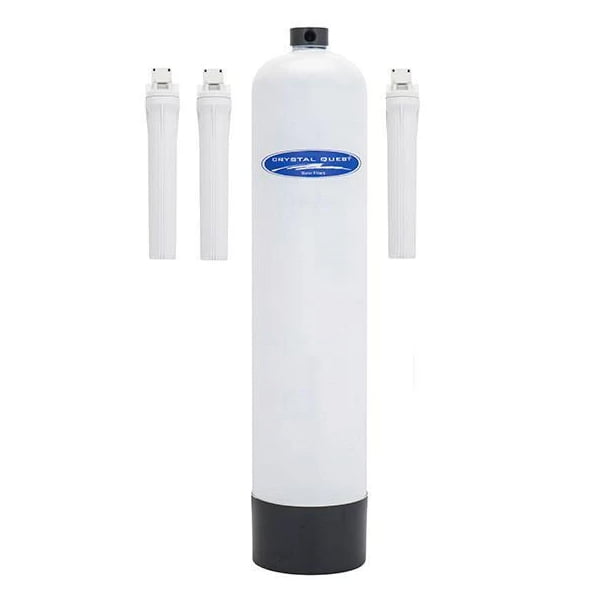
Crystal Quest Whole House Water Conditioner (+ Filtration) |
|
| Price: | $$$ |
| Type: | TAC |
| Flow Rate: | ? |
| Water: | For Up to 6 People |
| Warranty: | 1 Year |
|
Overall Rating: 4.0/5.0
Get 5% Off! Use Code: |
|
Gallery
Other Specs
- Model: CQE-WH-02132, CQE-WH-02133
- Last Price: $2,147.00-$2,393.00
- Maximum Water Hardness: 25 Grains Per Gallon
- Water Temperature: 35-100 °F
- Water Pressure: 20-60 psi
- Fitting: 3/4″ or 1″
Key Features & Pros
- Crystal Quest water treatment systems are Made in USA thus the higher price tag.
- Uses pre and post-filtration:
- First water flows through a pleated sediment filter (20 inches, 5 microns) to remove sediment, silt, sand, and dirt. Prolongs life of all other filter stages.
- First post-filter is a 20-inch solid coconut shell carbon cartridge. Removes volatile organic compounds (VOCs), pesticides, and other chemicals. Also removes unpleasant taste and odor.
- Second post-filter is a 20-inch ultrafiltration membrane (0.2 microns). Filters out colloids, bacteria, viruses, parasites, and other microorganisms and organic molecules + “most other water contaminations known today” (source: Crystal Quest).
- Filter stage 2 is where the actual water conditioning happens. Water flows through anti-scale media.
- All benefits are as mentioned in the first review.
- You can upgrade fiberglass tanks to stainless steel for longevity.
- Somewhat more difficult to install than the other water conditioners due to the additional filtration stages.
- Maintenance is kept to a bare minimum:
- Pre and post-filter cartridges last 1-3 years, depending on which filter stage as well as your average daily water consumption and feed water quality. Annual cost: Between $80 and $125.
- Softening media lasts up to 10 years.
- Crystal Quest water conditioners are warranted for 1 year.
Cons
- Water might require pre-treatment if iron, manganese, copper, phosphate, or hydrogen sulfide is present, or if water hardness level is too high.
- Best to contact Crystal Quest support team about this via live chat.
Our Rating
- Overall Performance: 4.0/5.0
- Softening Capacity: 5.0/5.0
- Purchase Price: 3.5/5.0
- Annual Cost: 5.0/5.0
- Overall: 4.0/5.0
Best for
The Crystal Quest is best if you want effective water conditioning in combination with pre and post-filtration.
7. Aquasana SimplySoft Water Conditioner
This is another water conditioner using scale control media to “naturally” lower the scaling effects of hard water. We can only assume that the process is very similar, possibly identical, to what SpringWell, USWS, Kind, and Crystal Quest water conditioners use. The result is that hard minerals which initially were in ionic form restructure into crystals which prevents them from binding and forming scale buildup. All other benefits are as listed in one of the above reviews.
Unfortunately, there have been numerous complaints about the effectiveness of the Aquasana SimplySoft. Bottom line: 3 stars.
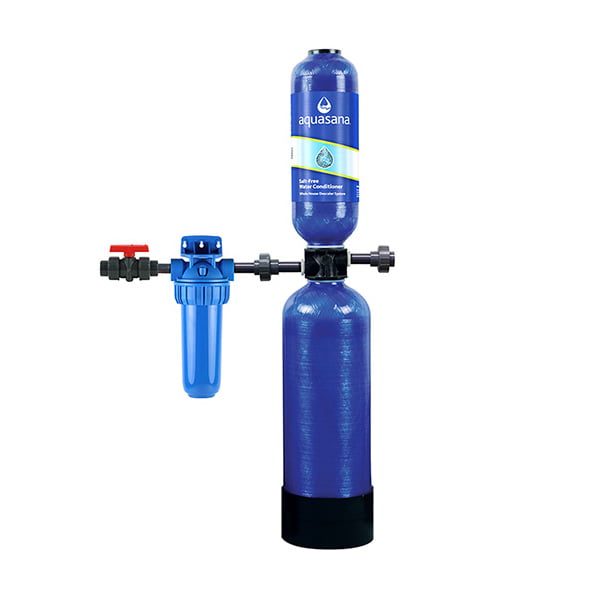
Aquasana SimplySoft Water Conditioning System |
|
| Price: | $$ |
| Type: | SCM |
| Flow Rate: | 7 gpm |
| Water: | For Up to 3 People |
| Warranty: | 6 Years |
|
Overall Rating: 3.0/5.0
Get Up to 50% Off! Use Code: |
|
Other Specs
- Model: WH-SFWC-S
- Last Price: $799.00
- Maximum Water Hardness: 20 Grains Per Gallon
- Service Life: Up to 1,000,000 Gallons or 10 Years
- WxHxD: 32″x46″x9″
- Water Temperature: 40-90 °F
- Water Pressure: 20-100 psi
- Fitting: 3/4″ or 1″
Key Features & Pros
- Water conditioner system doesn’t rely on salt or chemicals meaning it’s safe for your family, garden, and septic system, and the environment.
- All healthy minerals are preserved.
- You should be able to install the system yourself.
- Uses 5-micron sediment pre-filter to remove larger contaminants and increase the conditioner’s life.
- Requires replacement every other month. Total annual cost: $30.
- Aquasana offers a 90-day full satisfaction guarantee (only when purchased directly from the manufacturer). If you don’t like the conditioner you can send it back to receive a full refund of the purchase price – no questions asked.
- You get a 6-year limited warranty.
Cons
- There are too many disappointed customers for our liking. Some people even called the Aquasana SimplySoft a “waste of money”.
- Although the rated softening capacity is 6 years, we read reviews that reported systems stopped working after a mere 6-12 months.
- The water conditioner isn’t designed for very hard waters. Hardness levels below 25 gpg can be handled but the unit works best at 15 gpg or less, says the manufacturer.
- 7.0 gallons per minute water flow only works for small homes with 2 bathrooms.
- There’s no bypass valve which makes the installation more complicated if you want one.
- Changing the pre-filter can get a little messy.
Our Rating
- Overall Performance: 3.5/5.0
- Softening Capacity: 3.5/5.0
- Purchase Price: 4.0/5.0
- Annual Cost: 4.5/5.0
- Overall: 3.5/5.0
Best for
The Aquasana SimplySoft is best for people on a limited budget who still want a system applying crystallization.
8. Pelican NaturSoft Water Conditioners | Models NS3 & NS6
Last but not least, Pelican NaturSoft water conditioners. They’re pretty much identical to what SpringWell provides, using a special type of catalytic media to convert excess calcium in hard water into calcium carbonate crystals. These crystals have different characteristics than the dissolved calcium. Most importantly, they won’t attach to surfaces and thus scaling is reduced significantly. 4 stars!

Pelican NaturSoft Water Conditioners |
|
| Price: | $$$ |
| Type: | TAC |
| Flow Rate: | 10-15 gpm |
| Water: | For Up to 6 People |
| Warranty: | 1-5 Years |
|
Overall Rating: 4.0/5.0
|
|
Other Specs
- Model: NS3-P, NS6-P
- Maximum Water Hardness: 75 Grains Per Gallon
- Tank Width: 9″
- Tank Depth: 9″
- Water Temperature: 36-120 °F
- Water Pressure: 25-80 psi
- Water pH: 7.0-11.0
- Fitting: 1″ NPT
- NSF Certifications: Standard 61
Key Features & Pros
- Comes with sediment pre-filter.
- Protects your plumbing and water-using appliances from scale and dissolves existing buildup.
- Maximum hardness level: 75 gpg.
- For more benefits of reduced scaling please read above.
- WQA certified according to NSF/ANSI Standard 61 for material safety.
- Pelican NaturSoft NS3 water conditioner has a max flow rate of 10 gpm. Recommended for homes with 2, maybe 3 bathrooms.
- Pelican NaturSoft NS6 is larger and can supply homes with 4-6 bathrooms with enough conditioned water to meet the daily demand.
- Not more difficult to install than any of the other whole house water conditioners reviewed on this page. Process is quite simple.
- Optional Pelican installation kit has to be purchased at extra cost.
- Maintaining the system is quick and easy. All there is to do is replacing the pre-filter every 6-9 months. Cost: Approximately $30 per year.
- Tank is warranted for 1 year. Valve for 5 years.
Cons
- A few hundred dollars more expensive than our favorite water conditioner (SpringWell).
- Water should not contain hydrogen sulfide, hydrocarbons, oils, lubricants, phosphate (more than 1 ppm), or copper (more than 1.3 ppm).
Our Rating
- Overall Performance: 4.0/5.0
- Softening Capacity: 5.0/5.0
- Purchase Price: 4.0/5.0
- Annual Cost: 5.0/5.0
- Overall: 4.0/5.0
Best for
The NaturSoft NS3 and NS6 by Pelican are best for people who want an NSF-certified conditioner suited for small and large homes and high hardness levels.
Comparison List
(Mobile Hint: Swipe to Scroll)
| System | Price | Method | Max GPG | GPM | People | Warranty | Additional Info |
|---|---|---|---|---|---|---|---|
| SpringWell FutureSoft | $$$ | TAC | 81 | 12-20 | Up to 6+ | Life | |
| USWS GreenWave | $$$ | NAC | 81 | 10-25 | Up to 7+ | Life, 4 Years | |
| Kind E-2000 | $$ | TAC | 75 | 15 | Up to 6 | Lifetime | |
| Eddy Electronic | $ | Electronic | Not Specified | – | – | Lifetime | |
| P3 P7920 | $ | Magnetic | Not Specified | – | – | 10 Years | |
| Crystal Quest Whole House Water Conditioner | $$$ | TAC | 25 | ? | Up to 6 | 1 Year | |
| Aquasana SimplySoft | $$ | SCM | 30 | 7 | Up to 3 | 6 Years | |
| Pelican NaturSoft NS3 & NS6 | $$$ | TAC | 75 | 10-15 | Up to 6 | 1-5 Years |
Buying Guide: How to Choose the Water Conditioning System That’s Best for You
The following are key features worth considering when shopping for a water conditioning system. They will help you choose the right on for your needs and budget.
Types of Water Conditioners + Price Range
Water conditioners can be categorized into 3 types:
- Those that use catalytic media to alter the adhesion properties of hardness minerals, the most prominent example being Template Assisted Crystallization systems. They usually consist of a large tank + optional pre- and post-filtration. Cost: Highest.
- Systems that release a chemical additive into the water. Cost: Medium to high.
- Devices that induce a magnetic field within a water pipe. The magnetic field can be created through a wrapped wire (electromagnetic) or plain magnets. Cost: Lowest.
Type one is the most effective. A study has shown that up to 99.6% scale reduction can be achieved. Furthermore, even extremely hard water can be handled most water conditioners of this type.
As far as chemical water conditioners are concerned, it depends on the exact process. Some use a chelating agent like citric acid to bind calcium and magnesium ions which prevents the formation of scale deposits. Others rely on polyphosphate. Customer feedback for both is rather mixed. Personally, we’re no big fans.
According to research, electronic and magnetic water conditioners reduce scaling by about one-third to one-half.
Pre-Filtration
The only of drawback of TAC water conditioners is that they require pre-filtration if water contains too much iron, sulfur, manganese, copper, or other contaminants that could foul the media. These contaminants are often found in well water. Most tap waters should be just fine.
Flow Rate
As with all whole house water treatment systems, you want to make sure that your potential new water conditioner can provide enough conditioned water to meet your demand even at times of peak consumption.
As a rule of thumb, 12 gallons per minute water flow should be enough for homes with 1-3 bathrooms, 15 gpm can supply 4-6 bathrooms.
Space Requirements
Except for electric/magnetic units, water conditioners aren’t exactly small so make sure that you have the space to accommodate one.
Installation & Maintenance
You don’t need any prior experience to install the Eddy Electronic Water Descaler for example. However, if you want to install the SpringWell FutureSoft you should be at least somewhat experienced with tools. Pro tip: Make sure a bypass valve is part of the package which saves you from the extra hassle of installing one. A bypass comes in handy if you need to maintain or repair your system requiring temporary shutoff.
Of course, you also have the option to hire a professional plumber which will cost you a few hundred extra bucks.
In terms of maintenance, all water conditioners that are part of this buying guide can be taken care of by the homeowner. Usually, all there is to do is replace the sediment pre-filter cartridge once or twice a year – easy!
Seller + Warranty (Where to Buy)
We see absolutely no problem in buying a water conditioner online. Quite the opposite: We recommend it as you can compare a wide range of models from various brands/manufacturers using different technologies. And chances are that you’ll find the best prices.
That said, we prefer sellers that
- are responsive with US-based, technically-versed customer support.
- offer a trial period for all their products allowing you to return and receive a full refund if you’re not satisfied.
- back their systems with a lifetime warranty.
Of course, buying from a local dealer can have the benefit that he knows the water parameters in your area so that he can offer more in-depth advice.
Brand/Manufacturer
Personally, when it comes to whole house water treatment we really like SpringWell. But there’re more legit water conditioner brands and manufacturers out there.
More on Water Conditioners
What Is a Water Conditioner?
A water conditioner is any water treatment system that reduces the scaling effects of hard water without using salt as traditional salt-based water softener do.
As mentioned earlier, water conditioners can be categorized into 3 types: Template assisted crystallization (TAC) and other systems using a catalytic media bed, chemicals systems, and magnetic/electronic units.
What Are the Different Types of Water Conditioners and How Do They Work?
Template-Assisted Crystallization (TAC) Water Conditioners
TAC is based on a catalytic media bed. As the feed water flows through the bed, the majority of dissolved hard water ions are converted into relatively large crystals. This alters their adhesion properties. The crystals cannot stick to surfaces and remain suspended in the water along the way through your home’s plumbing system. The result: Up to 99.6% scale reduction.
In order to achieve high flow rates, a large media tank is required. And, depending on the condition of the feed water, pre-treatment might be mandatory – think high iron content.
Chelation Water Conditioners
As for water conditioners releasing a chemical into the water, they usually make use of chelation. Common chelation agents are citric acid or polyphosphate which bind the hardness minerals together to stop them from forming deposits. Results are mixed and we don’t like the idea of adding chemicals into our water so we wouldn’t recommend this water conditioner type if you can avoid it.
Electromagnetic and Magnetic Water Conditioners
Lastly, electric and magnetic water conditioners which induce a magnetic field into the main water line. The field can be created using wrapped wire or simple magnets. It causes calcium and magnesium to form microscopic crystals which precipitate out. As a result, scale formation is reduced by up to 50%.
Is a Water Conditioner the Same as a Water Softener?
Water conditioners and water softeners may serve the same purpose (fight water hardness), but they work completely different.
A traditional water softener uses sodium, or sometimes potassium, to remove hardness minerals from water making use of an ion exchange process. In the process, calcium and magnesium ions etc. – these are what’s causing the hardness in the first place – attach themselves to negatively charged resin beads super-saturated with sodium ions. The sodium (salt) goes into solution and the hard water minerals sticking to the beads remain in the softener’s resin bed until they’re flushed out during system regeneration.
In short, salt-based water softeners solve hard water problems by removing the hardness-causing minerals themselves.
In contrast, a water conditioner neither adds nor removes anything from water. All it does it alter the structure of the hard water ions so that they form crystals which forces them to remain in the water, rather than sticking to pipes and other surfaces.
When Should I Use a Water Conditioner?
There are different reasons for when using a water conditioner can make sense:
- For one, salt-based water softeners are banned in some regions in the US. That’s because they waste quite a lot of water during regeneration and also release excess sodium into the water supply. The former is a huge problem when water is already scarce. The latter could harm the environment including aquatic life, which is why water utilities have to remove the sodium affording resources.
- Another reason for using a water conditioner instead of a water softener is when your septic system cannot handle the extra load of water and salt resulting from system regen.
- Or maybe you don’t like the idea of buying and heaving heavy salts bags repeatedly.
- Some people prefer water conditioners because they can’t stand the slippery feel of softened water.
- Water conditioners don’t need a drain connection and are thus easier to install. Plus, they are pretty much maintenance-free. So if you are not the DIY type of guy, such a system would be ideal.
- Lastly, a water conditioner can be used to remove scale that already exists in your plumbing system.
Benefits and Drawbacks of Using a Water Conditioner
Advantages
Scale Prevention Protects Entire Plumbing System Including Home Appliances
Most importantly, a proper water conditioner reduces or completely eliminates the scaling effects of hard water. This means all plumbing elements in your home like pipes, fixtures, and fittings will last much longer and require fewer maintenance and repairs. The same goes for your water-using appliances (up to 30% longer lifespans).
In addition, even existing scale deposits will dissolve with time.
Water Heater Efficiency
A scale-free water heater works more efficiently which means lower energy cost.
No Downtime or Additional Expenses
Water conditioners don’t need to regenerate so no downtime and no additional expenses for wastewater/salt.
Little to No Maintenance and Low Media Consumption
A water conditioner barely requires any maintenance. All that’s needed is replacement of the catalytic media every 10 years or so. In addition, you might have to replace the sediment pre-filter in case you use one.
Easy Cleaning
Any remaining scale is much easier to wipe off.
No Slippery Water
The conditioned water doesn’t feel slippery.
Healthy Minerals Are Preserved
All healthy minerals will remain in your water adding to your daily nutritional intake.
Regular Sodium Levels
There’s no excess sodium in the water which is great for taste and health reasons.
Environmentally Friendly
The fact that water conditioners don’t waste water and don’t release excess salt helps the environment.
Disadvantages
No Reduced Staining
Traditional water softeners reduce staining. This is usually not so much the cause with water conditioners.
Hair and Skin
Often, there’s also no beneficial effect for your hair and skin.
Soap and Detergent Use Remain the Same
Water softeners help you save up to 50% on soaps and detergents. Unfortunately, the same does not hold true for water conditioners – at least in most cases.
Fabric
Nope, a water conditioner won’t prevent faded, scratchy laundry.
Frequently Asked Questions (FAQ)
- Do water conditioners really work?
Yes, water conditioners do really work. There’s a study that has tested their effectiveness and it proved that scale reduction of up to 99.6% is achievable. - How long does a water conditioner last?
A water conditioner can last a long time, more than a decade under the right conditions. Right conditions means you should use a pre-filter to remove sediments. When conditioning well water containing iron, sulfur, manganese, copper, and other contaminants that could foul the media, replacement might be required much sooner. - How much does a water conditioner cost?
Between $1,000 and $2,500, depending on the size of your household, is pretty common for water conditioners. This does not include installation fees, though. - What does a water conditioner do?
There are different types of water conditioners, but what they all have in common is that they reduce the scaling effects of hard water without actually removing any hardness minerals. - Do water conditioners help skin?
From a science perspective, this shouldn’t be the case. But we’ve heard from users that they saw an improvement in the health of their skin and hair using conditioned water.
Questions? Ask away!
Information provided on BOS is for educational purposes only. The products and services we review may not be right for your individual circumstances.
We adhere to strict editorial guidelines. Rest assured, the opinions expressed have not been provided, reviewed, or otherwise endorsed by our partners – they are unbiased, independent, and the author’s alone. We fact-check all content for accuracy. It is accurate as of the date posted and to the best of our knowledge.

